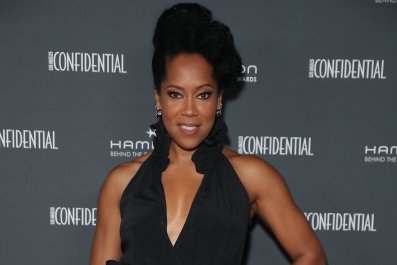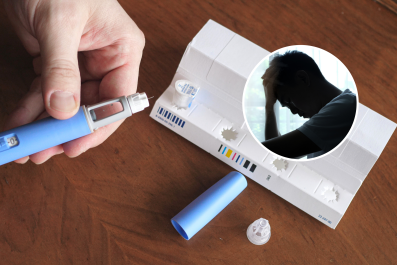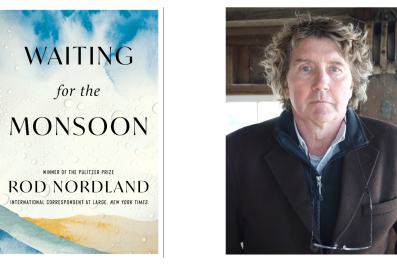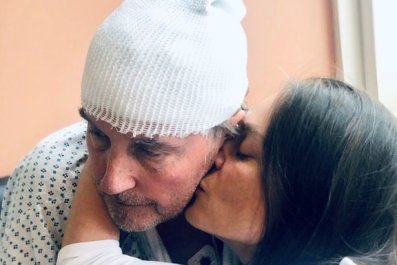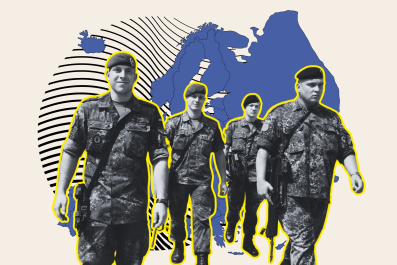"I allowed myself room to move and try different things and I think that started this whole guy who jumps around from genre to genre."
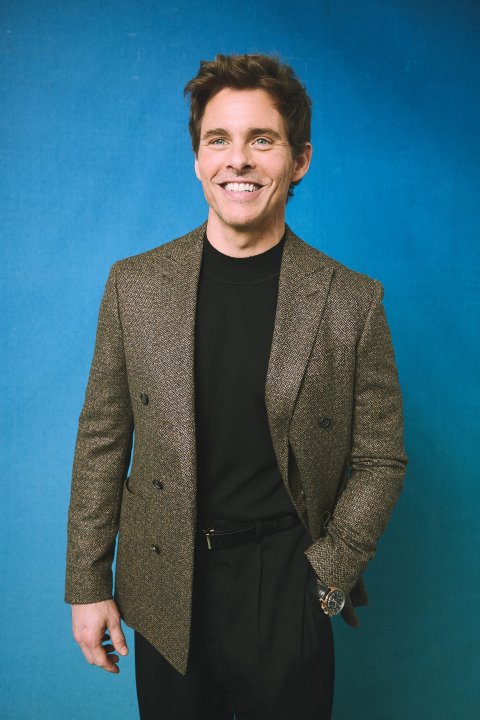
James Marsden is good at keeping fans on their toes. Following his Emmy-nominated success with Jury Duty, Marsden has three very different projects in 2024, the first being Michael Keaton's Knox Goes Away (March 15). "I like to take opportunities that are very different tone, and this was just like, 'Wow, you're in the company of great people here and how would I ever say no to this?'" Later this year he'll star in Sonic the Hedgehog 3. He says part of the franchise's success is that they've always wanted to "be like Fast and Furious meets one of those films. We want there to be action, we want the jokes to be smart." If that's not enough, he'll also appear in Jerry Seinfeld's Unfrosted. While raspberry is Marsden's flavor of choice, growing up, "Pop-Tarts was a luxury thing that I'd go to the bus stop and see my other friends eating. Like, what's this shiny aluminum-encased treat?" At this point, Marsden is proud of his genre-shifting career; he credits it with always aligning "yourself as much as you can with the best directors and the best material."
SUBSCRIBE TO THE PARTING SHOT WITH H. ALAN SCOTT
ON APPLE PODCASTS OR SPOTIFY
Editor's Note: This conversation has been edited and condensed for publication.
What first appealed to you about Knox Goes Away?
I've always loved Michael [Keaton], of course, and it's unlike anything I've ever really done before. And in this great kind of noir, adult film, you don't really see these types of films being made anymore. It was just something so different than Jury Duty. I like to try my best to take opportunities that are very varied and different tone, and this was just like, wow, you're in the company of great people here and how would I ever say no to this? It was more about whether or not Michael would have me. We sat down and met for about an hour and a half and talked life and kids and everything. [We] just kind of shot the sh** and got along really well and he invited me on board. It was a no-brainer for me. I grew up watching him. I always loved his career, because he could do something like Birdman and he can do something like Mr. Mom. I admire the actors that can do everything, really intense dramas and also gets the humor.
It's funny you mention that, because that's a connection I see between the two of you. You've been able to really blend genres in a similar way, from doing big comedy like Jury Duty and dramas like the series The Stand.
I mean, I would never compare myself to [Michael Keaton]. It's very nice of you to say that. I would argue it but with some humility. He's a legend and a superstar in his own right. I've always aimed for a career like his. He's had a very specific approach to the types of roles that he chooses. It feels like he likes to keep people on their toes [with] what to expect from him, or he's just an actor and really wants to explore all different types of material and roles. He really is a chameleon and he shape shifts. As far as the dynamic between he and I on set, and him being a director, I've worked with very few directors who used to be actors, and every time I've worked with one, it's just always been the greatest experience to have somebody that's been in your shoes and in that position where you're overthinking something or you've got imposter syndrome. "What am I doing? I'm overthinking what the scene is about and trying to muscle my way through this." To have somebody that knows, I don't care how great you are as an actor, those are familiar themes. He was great at just speaking a language that another actor would understand and guiding me through and avoiding mistakes or pitfalls and get[ting] you out of your own head. It was a very generous back-and-forth. Some directors think more about the technical stuff, obviously, and that's an art as well, and he definitely had his vision for the movie, but he really wanted to spend his time with the other actors. And like I said before, I don't think these movies are being made much anymore. That content sort of migrated to TV. It's cool to be in a great classic film with him and [Al] Pacino.
I was gonna say, it probably helps that Michael Keaton is the director because it gets people like Al Pacino, Marcia Gay Harden and you. What was it like working with a cast like this?
Well, talk about being anxiety-ridden about, "Do I belong here?" Wow, it was great. This is the type of movie and the type of cast that you always aim for. I want to belong there and feel you have a place there that you're working with people that are just gonna make you better. I know people say that a lot, but it's so true. When you're around those kinds of talents, it somehow makes it a little more effortless for you. Everything gets elevated. It's pretty cool. This was a dream of a movie for me. It's very different than Sonic the Hedgehog, but that's why I did it. It was just another challenge.
Speaking of casts, you're also in Unfrosted. How did that come about?
I heard that Jerry Seinfeld was gonna be directing. It was a movie about the invention of the Pop-Tart and it just all sounded absurd in a wonderful way. And then I learned about some of the other cast and I was like, "Yeah, what sort of ridiculous thing do I get to do in this?" And it's completely ridiculous. It's a cool cameo in the movie, and I just wanted to go in and play with all those people for a few days and have a good time. It was another one of those, "Well, I can't say no to this. This just seems like a fun party to go to."
I need to ask you something very important, and I need to warn you that there is a wrong answer. What's your go-to Pop-Tart?
Funny story about Pop-Tarts. I grew up in Oklahoma and my mom was raising three boys that were a year apart and a little daughter by herself and we had a box of cereal that just said "cereal" on it. Pop-Tarts was a luxury fancy thing that I'd go to the bus stop and see my other friends eating. Like what's this shiny aluminum-encased treat? I just had some sludge in a bowl. But when we were treated a few times to Pop-Tarts, I think the raspberry one was my favorite.
That's the correct answer, the berry ones, however, brown sugar cinnamon is the ultimate.
See, I would go for that if it wasn't cinnamon.
Oh, you don't like cinnamon?
I'm not a cinnamon man.
That's surprising.
Is that as polarizing as not liking cilantro?
Probably more so because cinnamon is a staple of so many delicious things.
Right, but are there people that are just like, either love it or hate it?
I don't think so. Some people put it in coffee and that's disgusting and wrong.
Yes. Cinnamon on a cinnamon roll.
I mean, yes. That's delicious.
Sure. Cinnamon toast with some butter and sugar.
An incredible treat.
Yeah, or some holiday drink. I don't know, it's interesting. When I see it, maybe unfairly on the box, I judge it.
I mean, give it a whirl. My boyfriend is also in the raspberry-no-cinnamon camp, so you're not alone.
I don't want to judge you. But I like your guy better than you.
I mean, I feel like he'd choose you, too. You're James Marsden! Speaking of, you've done a lot of great work on television, but your first Emmy nomination was for playing a version of yourself on Jury Duty. Were you surprised by how huge the response was to the series?
I was. It was a huge surprise. I loved the concept of it. I loved the idea of getting in a room full of improv artists and messing around and not really having a script. Just kind of see where it all goes. But I never anticipated the success that came from the show. I really didn't. We hoped for it. But this was like, the next day, people walking down the streets stopping me saying, you're all over Tiktok, you're blowing up, that Jury show. And then it just kept growing and growing and growing. It was pretty insane. I've never been a part of something that was that shot so quickly into the stratosphere. It was a huge surprise. The other reason why I was as surprised is I'm reminded that people don't always get to see me doing this kind of character, where I'm actually sending myself up or satirizing the Hollywood guy, which is my bit that I do all the time on my own. The people that know me know that that's something that I kind of do, this heightened version of myself. So now, you put it into the show, you're reminded that, "Oh, the rest of the world doesn't see you walking around on set doing this bit."
The strange thing to me, [people] will say, "You took such a risk." It didn't feel like a risk. It felt safe. Maybe because I'm more comfortable making fun of myself, honestly, than doing something like Knox Goes Away, where it's full [of] conviction and you're diving in and you're asking the audience to really go deep with you. That's a little more daunting and scary to me than making a dunce of myself, or at least highlighting the buffoon. Also, it was a reminder that, wow, when you think no one's really going to tune into something...I was thinking, well, who's going to? I don't know. Are [they] going to show up for Amazon Freevee? I don't know. This like, half-reality thing that feels like a game show but also there's an improv element to it. Who knows? So I just swung for the fences and did what I thought was funny. And what was removed was this feeling of everyone's watching, I need to be perfect, it needs to be great pressures. Because of that, I just kind of was like, "You know what? Screw it. I'm just gonna have fun."
And that's just it, it shows. Like it really felt like you belonged in that space of really great improvisers who are doing this meta-comedy. It was not even traditional. It's not even Curb Your Enthusiasm-level comedy.
They were all so great, by the way. Susie Farris, who cast it just brilliantly, handpicked each one of those actors, most of them relatively unknown. They just got the assignment and got the joke. But I guess I've always [liked that style of comedy], I mean, Christopher Guest has always been a hero of mine, where it gets a little blurry, the lines between scripted and non-scripted. Waiting for Guffman is one of my top three comedies of all time. I just always thought, "God I want to do that kind of comedy." I want to do something that feels so real and so unscripted and loose and like you're just allowed to be in this character and be as absurd and insufferable. I guess this kind of sounds method, but I've always wanted to do that kind of comedy, which is, hey, here's the joke, here's the purpose, the intention of the scene. Get there however you want. So I got really lucky with good people. And the challenging part was [Ronald Gladden], because you never know what he's going to say or do. David Bernard, who's a close friend of mine and we worked together on a couple of things—this movie D Train and he was a producer on White Lotus—he came to me with the concept and he said, "Hey, I know how funny you are, this would be great. I think that you'd be perfect for this role. And you'd be kind of making fun of yourself, but no one could do it better than you. And it's Lee Eisenberg and Jake Szymanski." And I'm like, "I'm in. I'm in." But you're in great company. I couldn't compare it to anything else that had ever been really done.
I think that's why it opens up a totally new direction for your career in a way.
I'm not sure how to parlay this into anything, really. [laughs] I can't really play myself again. I got the same pleasure playing that role as, I would imagine, that Larry David does on Curb, which is, I can't say these things in real life. It's just making sure that everybody knows that you're joking. If you don't know somebody is joking, it's like, "Jesus, Marsden is a prick." If you're smart enough to know that you're joking, it's a great mechanism to making fun of what we do in art, the celebrity lifestyle, and special treatment and entitlement and all that stuff. It's a way of kind of obviously poking fun at that without also completely disregarding what we do for a living. But, yeah, it was a huge surprise. And I'm very, very happy with how it turned out. I was concerned that we were doing some sort of psychological damage to poor Ronald.
He turned out OK.
He's doing good.
You also have Sonic the Hedgehog 3 coming out later this year, yet another example of a different genre of project for you. Can you believe you've been able to do three?
I mean, again, another one that you hope for, that it's gonna be a big success and people are going to love what you make. And [now] doing the third film, which is a great indicator that it's success. But I always have a little trepidation stepping into every role, I'm like, guys, is this is this going to be a good career move? Am I going to be good in this? And I remember with Sonic it was, "Okay, I did Enchanted, which I really loved. It was fun. But I'm dancing around with a little chipmunk in that. I did this movie Hop where I'm talking to a rabbit. If I do this movie, am I just the guy that's gonna talk to CGI rodents for the rest of his career?" Which can be lucrative, but creatively, I don't know. But I think the combination of Jeff Fowler, who is our brilliant director, and Neal Moritz, they added this feeling [of], we want this to be something more than Alvin and the Chipmunks, let's say, right? We want it to be like Fast and Furious meets one of those films. We want there to be action, we want the jokes to be smart. The audience is full of parents with their kids, and they want the parents to laugh. So it was a great blend. I couldn't ignore the popularity of Sonic. And I remember watching the first film at the premiere. I hadn't seen it yet, I was sitting next to Jim [Carrey] and Tika [Sumpter] and Ben Schwartz. And about 20 minutes in we all looked at each other like, "Damn, this is pretty good." So I felt proud about that.
Well, out of everything you've done, one of the things I love most about your career is that you were in the pilot of The Nanny. That was one of your first credits.
I had nothing to really compare it to other than working in Oklahoma mowing people's lawns. I was like, I'm getting paid to be an actor? Great. I'm happy. I do remember thinking there's no way this show goes. Like, a show about a nanny? And the voice? I just was thinking, we'll see. But, yeah, I had like two lines.
But they brought you back for another episode.
They brought me back for the third episode, it got picked up for six, if my memory is correct—it was 30 years ago. And it was a bigger episode where I'm taking the daughter out, but I'm into [Fran Drescher's character], anyway, I loved it.
Also to think about how different your career could have been if you had joined the cast as a regular.
A lot shorter. Yeah. [laughs] I don't know if it would have been shorter, that's not a slam on the show. It's just sometimes you're on a show for seven or eight years and you're not afforded the ability to go and do other types of roles and find your way. I remember even before that I was offered to test for Days of Our Lives. And I was thinking, "This is the greatest job." That contract is for three years. You get paid as an actor and I remember at the time my manager was saying, "No, no, maybe we don't want to do this yet. You're getting good feedback everywhere else. Maybe you want to do a prime-time show, maybe we'll do a movie and end up saying no to doing that." But my father, who just agreed to pay for my rent and my food and everything for a year—I've been in L.A. for a month, and I'm turning down jobs, and he's like, "What? What are you doing?" But I made a decision to really be okay with saying "no" and committing to the idea that if you're really just having the quality of the work be the centerpiece to why you're making this decision, that's going to equal a good career if you're going to have one. And I figured, just align yourself as much as you can with the best directors and the best material. So I allowed myself room to move and try different things, and I think that started this whole guy who jumps around from genre to genre. And it just kind of became not a trademark—I'd never be so arrogant to say that—but it's like [the] identity of my career, I guess.
And it was smart because you could have easily played more leading man roles, but instead you went for more obscure characters. Still leading man, but different.
I'm far more comfortable doing those roles than playing the leading man who's got all his sh** together.
I don't know, deep down I think you're a weirdo. I've always said attractive people should not be good at comedy. Maybe you're just a weirdo in an attractive body.
I want John C. Reilly's roles. I relate more to that than the guy who just always has every hair in place.
Well, it's worked out for you. So there you go.
Every now and then you gotta do something different. I mean, I love the comedy and I want to keep doing more and more of it, but it was a nice departure to come back to something like Knox and do something pretty heavy and pretty emotionally challenging.
Correction 03/13/2024 4:28 p.m. ET: The spelling of Amazon Freevee was corrected.




